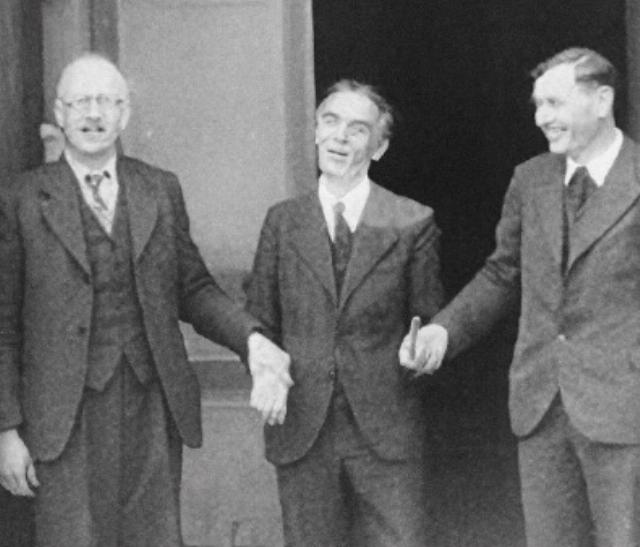‘Resist evil without pride and without hatred’
Fifty-two years ago, I found myself in a beautiful corner of central France as a camp counselor to twelve 8- and 9-year-old boys. Four were Algerian, and eight were French. I can still remember some of their names and faces: Kamal, Mohammed, Mustapha, Pierre, Michel, Nicholas, and Jean-Paul. It was a learning experience as well as a memorable one.
The camp lasted a month. I worked six days a week with one day off. On my day off, I would trek many kilometers to a small village called Le Chambon-sur-Lignon.

André Trocmé is on the left (image cropped, with AI used to enhance clarity).
There, I enjoyed the peace and quiet of life away from twelve very active garçons (“boys”). I especially enjoyed several cups of robust café au lait, drunk leisurely with a croissant or a croque monsieur sandwich. While walking through the village or sitting at the café, I enjoyed observing the villagers. People-watching is one of my favorite pastimes. At the time, I was unaware that I was among a very special group of heroes and heroines.
Many years later, I learned through a documentary film that, during World War II, these villagers were responsible for saving over 5,000 Jews from the Nazis and the collaborationist Vichy government. What made the story interesting and unique is the fact that these villagers and farmers were descendants of the Huguenots, who were also persecuted for their faith during the eighteenth century. Pierre Sauvage, the film writer and producer, entitled his documentary Weapons of the Spirit.
The villagers and farmers were almost exclusively Protestant Reformed Christians. André Trocmé, their pastor at the time, led them to resist the evils of the Nazi Holocaust “final solution.”
I was impressed with the way he encouraged his flock. He told them, “We will resist evil without pride and without hatred.”
Those words have lingered in my mind, and I can’t seem to let them go: “...without pride and without hatred.” He added, “The duty of Christians is to respond to the violence that will be brought to bear on their consciences with the weapons of the Spirit.” Over 80 years ago, those valorous villagers sheltered and fed many European Jews, who were hidden throughout the village. They were responsible for snatching over 5,000 lives from the fiery furnaces of Auschwitz and Treblinka.
Besides receiving and rescuing Jews, the villagers received the family of my Spanish and French professor, who were refugees from Franco’s fascist Spain. Mademoiselle Minnaro was a child when they arrived in France and shared her story with me. They became French citizens.
Now, 81 years later and half a world apart, we too are called to resist evil. Perhaps the evil is abortion, social and racial injustice, rampant immorality, the breakdown of the family, secular humanism, antisemitism, or rising political violence. Are we able to “resist evils without pride and without hatred?”
As these two concepts progress in my own thinking, both lead to the same goal: “To the glory of God.” Whether Christian or Jewish, as people of faith, seeking to save a race of people chosen for extermination, an unborn child from premature death, a society from bigotry and racism, and antisemitism, the family unit from extinction, or current political violence, we must be ever mindful that the battle of spiritual warfare can only be waged with spiritual weapons and spiritual wisdom.
As a Reformed Christian myself, I am so pleased and proud that very simple people— farmers and villagers of my faith—courageously and righteously rescued the most vulnerable during that horrendous period. Their pastor’s poignant words—“resist evil without pride or without hatred”—set such a high standard. They were a tall order, but the villagers rose to it. I dare to suggest another formulation that is perhaps more positive: “Resist evil with humility and compassion.”
It’s evident to many of us of different faiths that we are living not only in difficult days, but days evidencing growing evil. May we gain courage from these French Christians who had been so persecuted themselves that they, in turn, humbly and piously rescued so many other persecuted peoples.